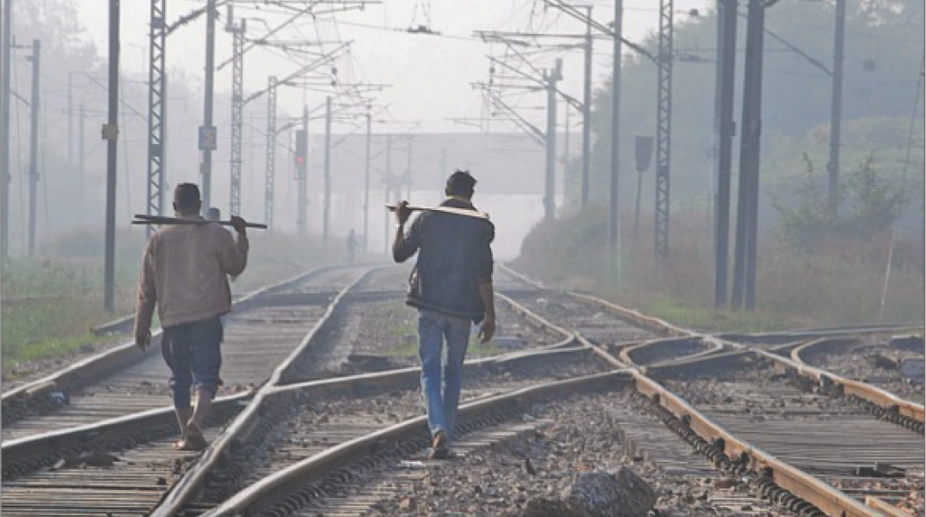Mahakumbh: Railways work ensure devotees have smooth journey
Despite continued heavy rush, Indian Railways is working on war footing to serve the devotees by bringing them in and taking back their home during the ongoing Mahakumbh.

Representational Image (Photo: Subrata Dutta/SNS)
Railways need to strengthen track safety measures as an audit has revealed several lapses in maintenance plans, inspection schedules and usage of high-end machines procured to detect track defects, according to a CAG report tabled in Parliament on Tuesday.
The Comptroller and Auditor General of India (CAG) report said that during 2014-2015 to 2016-2017, 16 accidents or derailments took place due to deficient track maintenance in five zonal railways (South Western Railway, North Central Railway zone (NCR), East Central Railway zone (ECR), South Eastern Railway zone (SER) and Southern Railway) it audited.
Advertisement
It said that 294 permanent speed restrictions (PSR) were imposed on select sections because of track vulnerability.
Advertisement
The audit covered the period from April 1, 2016 to 31 March 2017, focusing on maintenance of tracks on selected 29 sections of high density network routes (HDN) and eight sections of non-HDN routes.
“Audit of 37 selected sections of the Indian Railways showed that track maintenance activities needed to be strengthened and undertaken following the laid down instructions and guidelines…. Inspections were not being done as per laid down frequency by railway officials,” the report said.
The report said that while in North Central Railway zone (NCR) and East Central Railway zone (ECR), maintenance plans were not prepared, South Eastern Railway zone (SER) was rectifying deficiencies on inspection and not as a preventive measure as is the norm.
It also said that patrolmen were not equipped with any communication equipment to report any failure, fracture or damage immediately from the sections where they have been observed.
“Audit noticed shortfalls and deficiencies in inspections carried put at different levels…testing of rails using Ultrasonic Flaw Detection (USFD) machines was not carried out as per the prescribed norms,” the report stated.
The report also stated that deep screening of ballast which is required to restore the resiliency and elasticity of the ballast bed and for improving running quality of track had significant backlog and in some sections it was overdue for one to 22 years.
The audit noticed 274 cases of rail fractures and 465 cases of weld fractures during 2015-2016 and 2016-2017 in the selected zones. During this time seven accidents occurred due to rail fractures, it said.
The report also stated that that there was shortage of staff in different safety categories responsible for track maintenance ranging from nine to 22 per cent in different railway zones.
“The situation was made worse by diverting available track maintainers to works other than track maintenance… more track maintainers have been posted to bigger cities than remote locations though the requirements for the whole section may be uniform,” the report said, adding that there was a shortage of about 50 per cent blocks against the block demanded by engineering department for maintenance work.
The report said that zonal railways impose speed restrictions on various sections due to poor track structure.
“Each speed restriction has a cost attached to it and prolonged imposition would also have a financial impact in addition to the operational impact. It is therefore necessary to ensure completion of works within a set time frame so that speed restrictions are removed at the earliest,” CAG said.
The report also said that all zonal railways should prepare an integrated track maintenance plan for day to day activities as well as periodical maintenance and condition monitoring using machines such as the ultrasonic flaw detection systems (USFD) and track recording cars. The national transporter has recently procured some such devices which are being used in certain sections, officials said.
It also said that patrolling and inspection of tracks should be done as per norms and the teams should be equipped with GPS enabled devices.
The Railways has allocated Rs 7,267 crore in the 2018-19 budget for safety-related works — including track inspection, repair and maintenance — a massive jump from Rs 1,933 crore in 2017-18, underlining the priority it is giving to accident prevention measures.
Advertisement